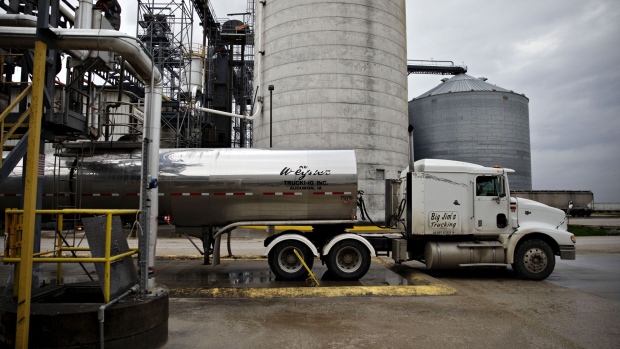Jun 15, 2021
Biden Weighs Middle of the Road Biofuel Quota in Nod to Refiners
, Bloomberg News

(Bloomberg) -- The Biden administration is developing targets for biofuel use in 2021 and 2022 that are likely to be relatively flat or even slightly lower as it seeks to balance the interests of blue-collar refining workers and advance a clean-energy agenda.
The Environmental Protection Agency is set to propose the renewable fuel requirements within weeks, according to several people familiar with the strategy who asked not to be named before a formal announcement. The targets dictate how much corn-based ethanol, biodiesel and other renewable fuels oil refiners must blend into their products. The proposal is on track to be issued after the Supreme Court makes what could be a pivotal ruling on the EPA’s ability to exempt refineries from the mandates.
Oil refiners meet the government’s biofuel quotas either through blending renewable fuels themselves, or by purchasing credits from others that have. Prices for some of those credits have hit all-time highs this year on expectations the Biden administration would impose more ambitious quotas and stop exempting refineries from them. Corn and soybean prices have also climbed on expectations of more demand from biofuel makers.
Instead, the EPA is considering more modest targets, according to three people familiar with the matter who asked not to be identified describing internal deliberations. The agency is also moving to abandon a plan for incorporating waived quotas that had been adopted under former President Donald Trump.
The move responds to pressure from refining advocates who have warned about mounting costs for the tradeable compliance credits.
An EPA spokesman declined to comment on the matter.
Labor Advocates
Democrats from the president’s home state of Delaware, including Governor John Carney and Senators Tom Carper and Chris Coons have asked the EPA to give refineries more time to satisfy last year’s quotas and ensure new 2021 requirements that reflect the pandemic-spurred drop in fuel demand. Labor leaders also have also pressed President Joe Biden to set “reasonable” blending quotas and compensate for 2020 targets they say were “well above the amount of biofuels that could possibly be blended into the fuel supply.”
The Biden administration’s decision could have profound implications for non-integrated refineries across the Northeast U.S., including PBF Energy Inc., and Delta Air Lines Inc.’s Monroe Energy, which have urged EPA to lower quotas.
Those considerations have factored into the EPA’s decision making so far, according to four people familiar with the agency’s approach. EPA officials have gamed out numerous scenarios as they seek to respond to the refining concerns without undermining the renewable fuel program, the people said.
Those options include maintaining or slightly reducing blending requirements for 2021 and 2022, while also ending a short-lived practice of incorporating estimated waived quotas. While a slight reduction in targets is under consideration, the agency is not likely to make steep cuts in biofuel requirements, two of the people said.
‘Completely Shocked’
The efforts mark the Biden administration’s first foray into the notoriously contentious Renewable Fuel Standard, a 16-year-old federal law that requires refiners and fuel importers to mix biofuel into gasoline and diesel.
The EPA monitors refiners’ compliance with annual quotas via the system of tradeable credits known as Renewable Identification Numbers, or RINs, that are generated by blending biofuels. Refiners that fall short of biofuel-blending quotas can buy the credits from other refiners and traders.
Biofuel advocates are pushing back against quota reductions, with lawmakers from rural, corn- and ethanol-producing states preparing to make direct appeals to EPA Administrator Michael Regan, according to three people familiar with the matter.
“I would be completely shocked if the Biden administration actually took action to weaken or undermine the Renewable Fuel Standard,” said Geoff Cooper, head of the Renewable Fuels Association. “It would embolden the fossil energy industry and threaten the president’s entire clean energy and climate agenda.”
New Biofuels
EPA staff are working to approve new biofuels for use under the program, a move that could expand production of alternative fuels as well as RINs associated with them. EPA officials also have been asked to consider delaying the deadline for fulfilling 2021 quotas, a move it already took for 2019 and 2020.
It is unclear how the EPA will address a lingering 2017 court ruling that found the agency improperly waived 500 million gallons worth of quotas in 2016. Biofuel supporters have pressured the agency to incorporate those requirements, while refining advocates have suggested ways they could be mostly set aside.
Complicating matters, the Supreme Court is set to rule within weeks -- and as soon as Thursday -- on a case that tests the EPA’s ability to exempt small refineries from annual blending quotas. The Biden administration already urged the high court to limit those exemptions, and it isn’t expected to widely issue waivers even if the Supreme Court disagrees.
©2021 Bloomberg L.P.


